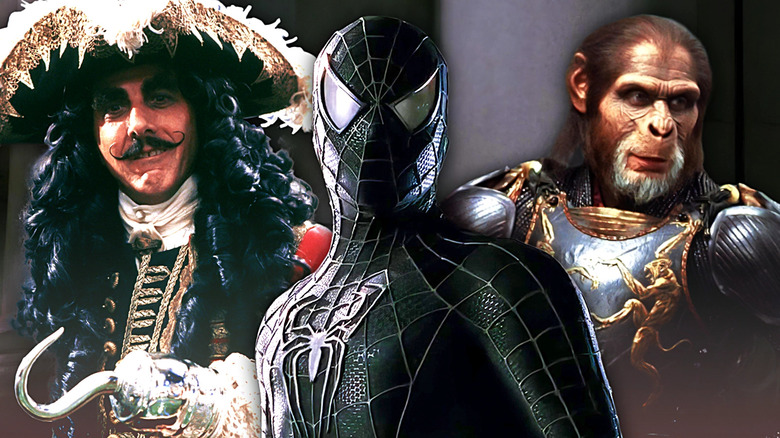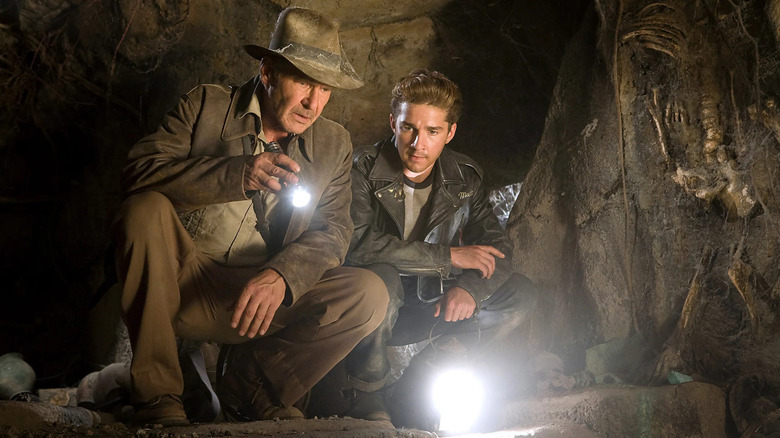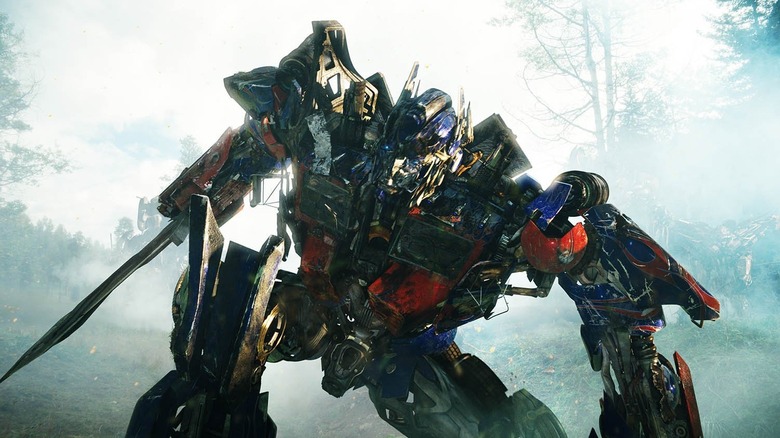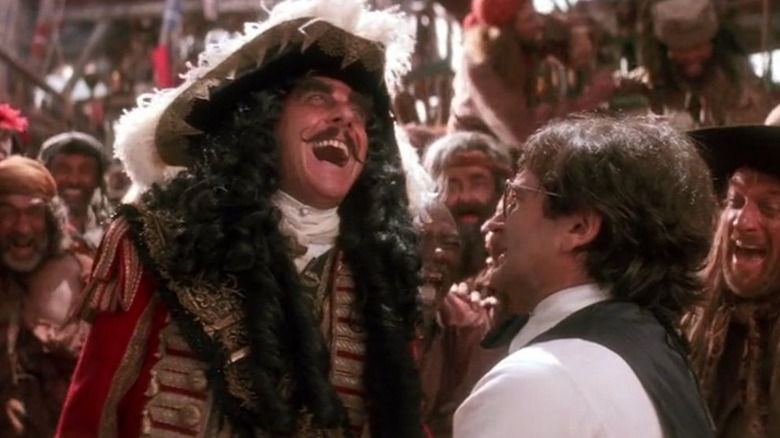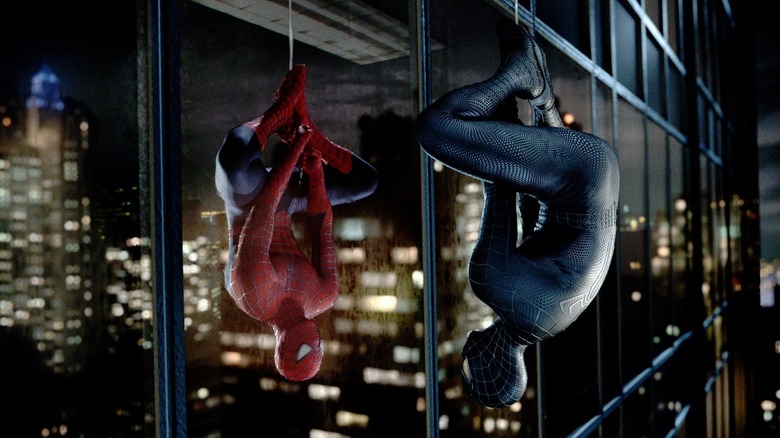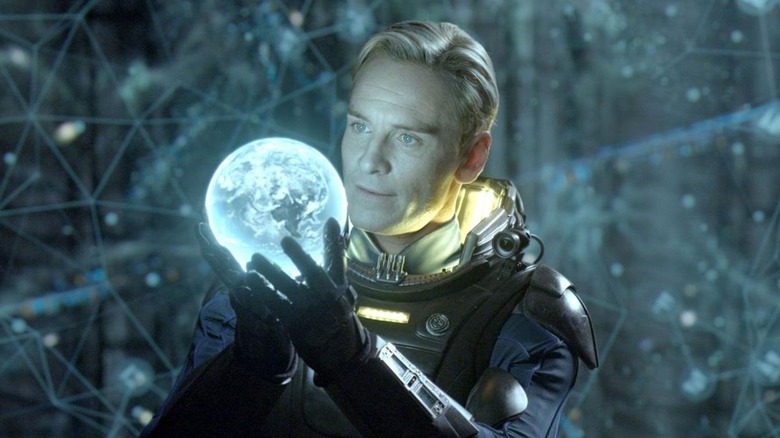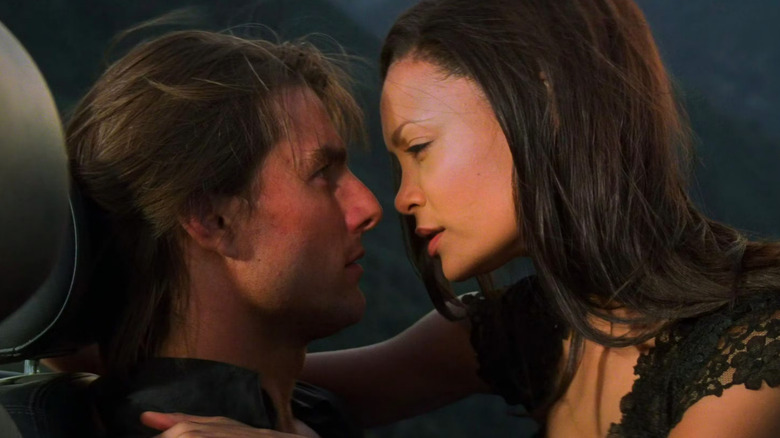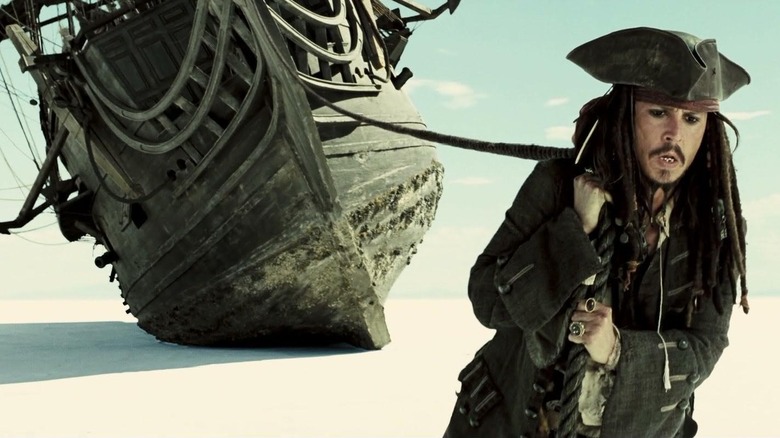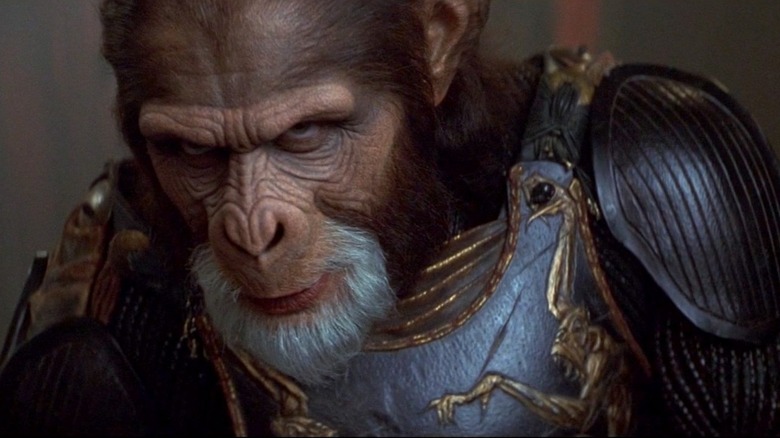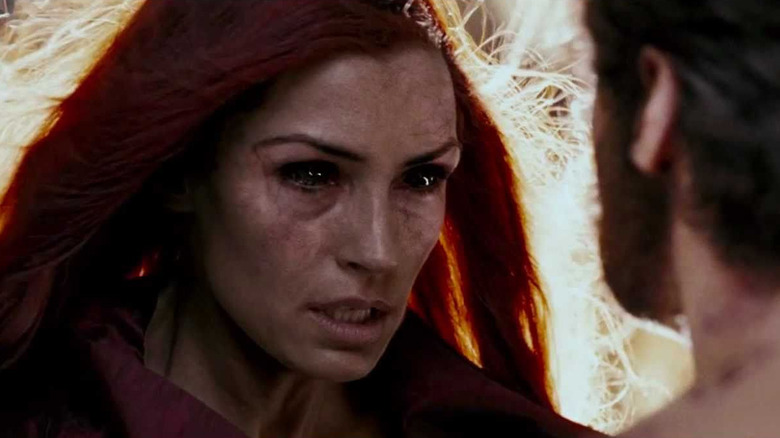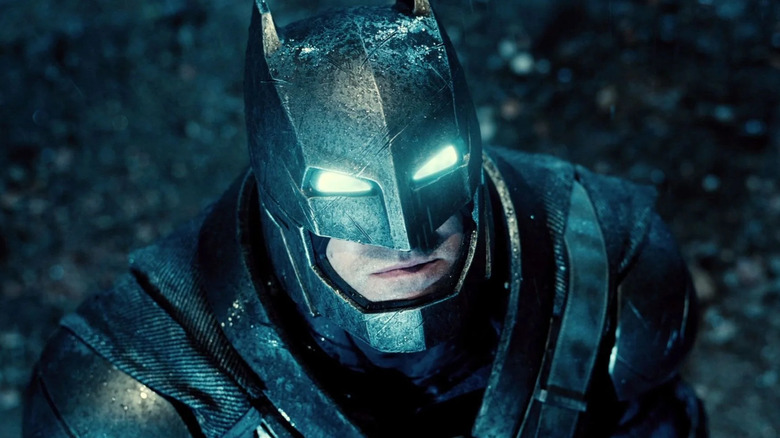10 Blockbuster Movies That Didn't Live Up To The Hype
Anyone who loves movies has suffered the agony that hits when an anticipated blockbuster fails to meet expectations. Believe us when we say, we feel your pain. While it's fair to admit that, at times, disappointment stems from our own unrealistic hype — sky-high anticipation no film could possibly satisfy — more often than not, the fault falls on a poorly or lazily produced product.
Blame the blockbuster formula, which often forces directors to begin filming without a finished script and hands creative control to the marketing department once the budget balloons past the danger zone. By default, any picture that costs north of $200 million has to appeal to the widest audience imaginable to recoup its cost, meaning bean counting takes precedence over creativity. A picture like "Hancock," starring Will Smith, for example, might have played well to a niche audience, but since it cost over $150 million to make, its darker edge was replaced with a far more commercially friendly tone (replete with a couple of confusing plot twists) in the hopes of spawning a franchise.
All this to say, for every "The Dark Knight," we likely get two or three blockbusters that don't live up to the hype. Here are 10 that instantly spring to mind.
Indiana Jones and the Kingdom of the Crystal Skull (2008)
When Indiana Jones (Harrison Ford) rode off into the sunset with his dad (Sean Connery) at the conclusion of "Indiana Jones and the Last Crusade," everyone, including director Steven Spielberg, assumed that was the last hurrah for the famed, Nazi-punching archaeologist.
Except, in the mid-'90s, fans began clamoring for more adventures with Indy. Begrudgingly acknowledging these pleas, Spielberg and George Lucas sought out a myriad of writers, including M. Night Shyamalan, to pen a script. Finally, in 2008, "Indiana Jones and the Kingdom of the Crystal Skull" hit theaters and ... well, it's more memorable for coining the phrase "nuke the fridge" (used to describe a film or TV show that flies off the rails) than for supplying a new chapter fans could actually savor.
To be blunt: It sucks. While there are certainly elements worth admiring, such as an opening action sequence set within Area 51 and a fun chase through a college campus, Spielberg's fourth chapter lacks the spark of previous efforts and just sort of chugs along until the credits roll. Had it released a few years after "Last Crusade," we might have shrugged it off as a lazy Spielberg effort, kinda like "The Lost World." Instead, we waited nearly two decades for this?
"Crystal Skull" is at least leagues better than the more recent "Indiana Jones and the Dial of Destiny" — but that's not saying much.
Transformers: Revenge of the Fallen (2009)
In 2007, Michael Bay hit pay dirt with the summer blockbuster "Transformers," a big-screen adaptation of the popular Hasbro action figures that was leagues better than it had any right to be. Paramount quickly green lit a sequel (the first of many "Transformers" follow-ups), and two years later, "Transformers: Revenge of the Fallen" thundered into theaters.
Audiences turned up in droves for the sequel, resulting in a colossal $840 million worldwide haul — higher than the original's $710 million gross — but you'd be hard pressed to find someone who likes it. Critics ate it alive, and even Bay has publicly called it "crap," blaming a poorly timed writer's strike for ruining the script.
He's not wrong. The sequel is crap.
"Revenge" takes everything that worked in the first movie — cool robot action, Shia LeBeouf screaming, Megan Fox looking amazing, obnoxious side characters — and nukes it to oblivion, resulting in a loud, disjointed, joyless spectacle. Oh sure, it has moments, including a wicked forest battle, and the special effects still pack a punch. Still, it's plain to see that no one involved with this bloated production cared much about the plot or characters. In an interview with SlashFilm, writer Ehren Krueger admitted that he and Bay "talk about sequences and visuals and moments" rather than story and narrative, which is the perfect summation for "Revenge of the Fallen": a series of moments that don't add up to much more than a headache.
Hook (1991)
We promise we're not picking on Steven Spielberg — the guy is an absolute legend. Yet even the best stumble on occasion, as the Beard did with 1991's "Hook." Arriving at Christmas, many expected this tale of a grown-up Peter Pan to traverse the same classic family adventure territory as "E.T. the Extra-Terrestrial."
Alas, despite strong performances from its star-studded cast, namely Robin Williams, Dustin Hoffman, Julia Roberts, and Bob Hoskins, state-of-the-art special effects, and a massive (for its time) $70 million budget, "Hook" never truly takes flight due to surprisingly flat-footed execution. Everything from the rambunctious, skateboarding, basketball-playing Lost Boys to the oversized sets and predictable plot feels manufactured — inspired less by Spielberg's imagination than by a team of marketers hell-bent on hitting every demographic imaginable for maximum profitability.
Here's the question: Would "Hook" have worked better as the musical Spielberg originally envisioned? Viewed through that lens, the Broadway-style sets, rhythmic pacing of certain scenes, and over-the-top performances suddenly feel more intentional and might have played better with audiences. Or is this simply a case of a paint-by-numbers script undermining a novel idea, or a director whose lack of faith in the project clashed with a production in desperate need of creative pixie dust?
Either way, "Hook" disappointed upon its release and remains a curious Spielberg misfire, a unique concept that needed more sure-footed direction to conjure movie magic.
Spider-Man 3 (2007)
Kids today will never understand the massive hype that preceded Sam Raimi's "Spider-Man 3," the third chapter in his groundbreaking "Spider-Man" franchise "Spider-Man 2" — one of the best comic book films ever made — set the stage for a spectacular conclusion, ending on a cliffhanger in which Mary Jane (Kirsten Dunst) chose to be with Peter Parker (Tobey Maguire) despite the danger such a life would bring.
A badass Comic-Con trailer only fueled expectations, teasing villains like Sandman (Thomas Haden Church) and Venom (Topher Grace), along with further developments with the conflicted Harry Osborn (James Franco). What could go wrong?
Well ... a lot.
"Spider-Man 3" practically swings into a wall, undone by studio interference — Avi Arad forced Venom into the story — an overstuffed plot, and a handful of cringey scenes that play better as gifs than as part of an epic motion picture. You can practically see Raimi's sweat and blood on the screen as he tries to mash dozens of plotlines into a single coherent whole. Key developments, like Harry's transformation into the New Goblin and Mary Jane's doubts about her relationship with Peter, feel rushed. Meanwhile, Peter's arc gets buried in melodrama and awkward, poorly timed comedy.
Oh, and so much crying.
With great power comes great responsibility, and unfortunately, "Spider-Man 3" dropped the ball on both. On a positive note, "Spider-Man: No Way Home" gave Maguire's Spidey a final chance to shine.
Prometheus (2012)
Credit must go to Ridley Scott for attempting to redefine the "Alien" franchise. Unfortunately, the result was 2012's "Prometheus," a visually dazzling, albeit clunky, prequel to "Alien" that neither frightens nor enlightens, and instead gets too lost in its own pseudo-intellect to produce anything close to blockbuster entertainment.
Too bad, because audiences were eager to scream at Scott's latest brand of nightmarish extraterrestrials and killer robots. Instead, they were served a half-baked collection of ideas, a few mild stabs at horror, and a batch of forgettable characters whose stupidity seems to increase as the film progresses. Oh, and there's also David (Michael Fassbender), a synthetic experiencing the robot equivalent of a midlife crisis.
He's miffed, you see, that none of his human pals respect his brilliance. And so, he sets out to play God, using a mysterious black goo that conveniently does whatever the script needs it to do in any given situation. The goo creates life, but also destroys it; mutates worms into killer snakes, but also transforms humans into rage monsters. When David spikes a fellow crewman's drink with the goo, the man gets sick and dies — while his girlfriend, who previously had sex with him, somehow spawns a giant squid.
As Dr. Evil would say, "Riiiiiiight."
Black goo, space engineers, robot daddy issues, "Prometheus" had it all. Except logic. Or tension. Or characters you don't actively root against.
Mission: Impossible 2 (2000)
Believe it or not, there was a time when the "Mission: Impossible" series was little more than a weird, confusing, but incredibly entertaining Brian De Palma flick starring a baby-faced Tom Cruise. That 1996 effort hit big at the box office and whetted audience appetites for a sharper sequel. Buzz only grew louder when action maestro John Woo signed on to direct, promising a more kinetic spy thriller the second time around. Excitement peaked when the official poster dropped, featuring a bruised and battered Cruise with long hair, framed by a massive fireball.
Surely, this would be the movie of summer 2000.
Not so fast. "M:I-2" made a killing at the box office, but it arguably set the franchise back by a decade. Bursting with wall-to-wall action, Woo's entry is regrettably bogged down by a bland storyline, excessive mask reveals, and an almost obsessive focus on Cruise's character. Teammates Luther Stickell (Ving Rhames) and Billy Baird (John Polson) spend most of the film watching from the sidelines while Cruise's superhuman spy zips around on motorcycles, leaps off cliffs, and beds Thandiwe Newton. Honestly, they should have called it "Tom Cruise: The Movie."
Look, we enjoy a dumb summer flick as much as the next person, but "M:I-2" is so eager to impress with its wild action that it forgets to deliver an impossible mission that actually pins us to the edge of our seats. Don't worry, they finally got it right with "Ghost Protocol" most of the sequels that followed.
Pirates of the Caribbean: At World's End (2007)
Weeks after "Spider-Man 3" delivered a running kick to the face of our lofty expectations came another hotly anticipated "finale" — "Pirates of the Caribbean: At World's End." Once again, moviegoers swung into theaters dressed in pirate garb, expecting an explosive conclusion to the "Pirates" franchise, especially after that wild cliffhanger at the end of "Dead Man's Chest." Once again, we were sorely disappointed.
No, "At World's End" isn't terrible. In fact, it's quite enjoyable, especially when compared to the abysmal sequels that followed. But this third chapter didn't live up to the hype or push the franchise in any meaningful direction. Instead, it drags its feet toward a predictable conclusion — look, another CGI battle! — focusing more on bloated spectacle than the quirky character beats that defined the first two entries.
Worse, everyone involved caters to Johnny Depp in the worst way, allowing the actor to run unchecked through the film. His performance veers closer to his bizarre turns in "The Lone Ranger" and "Charlie and the Chocolate Factory" than the original "Pirates," lacking the multifaceted charm that earned him an Oscar nomination. There's also too much of him.
"At World's End" piles on endless double-crosses, bloated action scenes, and plot holes big enough to sail the Black Pearl through — leaving you longing for the simpler days when all these pirates wanted was booze, women, and gold.
Tim Burton's Planet of the Apes (2001)
Here's another example of a decent summer blockbuster undone by its ungodly production period. "Planet of the Apes" languished in development hell for decades, during which everyone from Oliver Stone to Peter Jackson took a stab at the script to no avail. Eventually, the reins passed to Tim Burton and, well, Tim Burton did what Tim Burton does: craft a weird, visually impressive tale that doesn't make much sense. In short, he was the wrong man for the job.
Cobbling together a mishmash of old drafts, writers William Broyles Jr., Lawrence Konner, and Mark Rosenthal fail to deliver anything resembling the sharp political commentary of the 1968 original. Instead, a miscast and dead-eyed Mark Wahlberg crash-lands on a planet inhabited by apes and spends the next 100 or so minutes trying to escape. And that's about it.
Rick Baker's practical ape effects are astonishing, but none of the ape characters — aside from Tim Roth's snarling General Thade — carry much depth or emotional weight. They exist to move the plot along or mutter iconic lines from the original film. Everything builds to a dull, chaotic battle sequence that looks like every other action set piece from the early 2000s. Top it off with a nonsensical "twist" ending that tries — and fails — to echo the original's iconic finale, and you've got yourself an underwhelming movie that didn't come close to living up to its absurd hype.
X-Men: The Last Stand (2006)
In another universe, Bryan Singer doesn't bail on the "X-Men" franchise to direct the middling "Superman Returns," and instead helms "X-Men: The Last Stand," delivering a grandiose blockbuster that expertly caps off the mutant saga. Other than the filmmaker's controversial history, sounds nice, doesn't it?
Well, in the real world, audiences endured Brett Ratner's "X-Men: The Last Stand." All things considered, we'd be remiss if we didn't at least tip our hat to Ratner for creating a watchable product. The man was forced to wrap up key storylines and character arcs, introduce the Mutant Cure plot, and tackle the famed "Dark Phoenix" saga, all within the boundaries of a rushed nine-month production schedule and Singer's massive shadow looming over every move.
"The Last Stand" almost works as a dumb blockbuster, complete with a stirring, quip-heavy finale set on Alcatraz where hordes of mutants charge at each other like "Braveheart" extras. Still, nothing about this would-be epic feels extraordinary. Every character beat, line of dialogue, and action sequence is rendered so generically that you'd be hard-pressed to remember any of them minutes after leaving the theater.
"X-Men" vets Hugh Jackman, Patrick Stewart, James Marsden, and Ian McKellen are largely wasted, and Jean Grey's (Famke Janssen) carefully crafted Dark Phoenix arc lacks the emotional punch required to end the trilogy with a bang.
If you really want to get upset, check out the concept art for Singer's version — it's enough to make grown men cry over what might have been.
Batman v Superman: Dawn of Justice (2016)
This entry might seem controversial to some (including yours truly), but many people downright hate Zack Snyder's "Batman v Superman: Dawn of Justice." Whether it's the film's dark tone — which clashed mightily with Marvel's candy-colored aesthetic — the clunky script that tried to shoehorn too many ingredients into an already full-to-the-brim pot, or studio interference that cut a key 30 minutes from the production, rendering an already convoluted plot even more confusing, "BvS" left many fans disappointed and struggled mightily against expectations.
Admirers will say the film delivered on its promise, as Batman does indeed go up against Superman, an event that heralds the dawn of the Justice League. Detractors, meanwhile, argue that Snyder simply doesn't understand what makes Batman (Ben Affleck), Superman (Henry Cavill), and Wonder Woman (Gal Gadot) appealing to comic book aficionados. At this stage in the comic book movie craze, audiences yearned for hopeful superheroes akin to James Gunn's recent "Superman." "BvS" instead took its cues from comics like Frank Miller's super-bleak "The Dark Knight Returns" and "The Death of Superman," and put viewers through the emotional grinder, beginning the downfall of his DC Extended Universe, albeit with the promise of brighter days to come.
Again, there are plenty who enjoy this brooding cinematic smackdown, but more still who would just as soon watch paint dry than revisit Snyder's epic.
